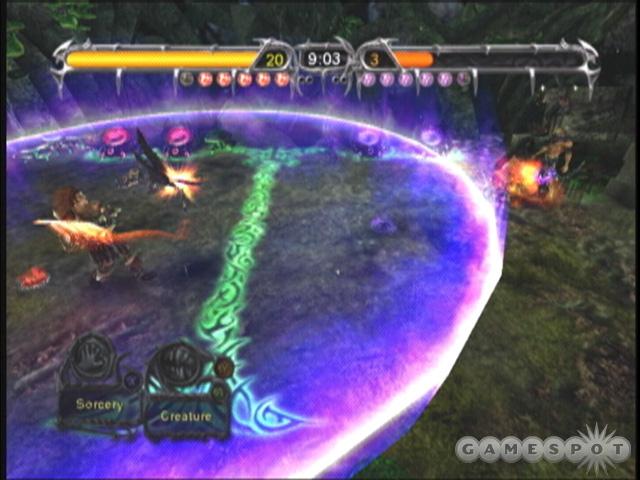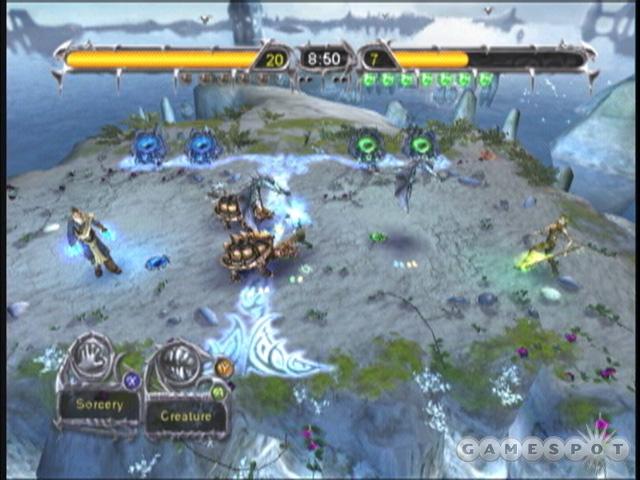The popular collectible card game Magic: The Gathering has already made its way to the video game world on a few different occasions. The more successful forays have been pretty faithful to the original card game, but so far, attempts to expand the world of Magic: The Gathering beyond electronic representations of the card game have been failures. Atari and Secret Level are the latest publisher/developer duo to take on the popular franchise with Battlegrounds, a real-time game that takes pages from the Magic: The Gathering playbook but attempts to spin them in a faster-moving fashion. The resulting product hits a few minor snags here and there, but it's still a successful transition for the long-running card game.

While Battlegrounds certainly starts out in the same world as the original card game, it makes several changes to the rules of the game, which is natural when you consider that the card game is a slow, turn-based affair and Battlegrounds is more of a real-time strategy game. For starters, the game doesn't really have anything to do with cards at all. Instead of drawing and discarding cards, your spell book, which is limited to 10 spells, is available at all times. The card game uses land cards to give you spellcasting points. In Battlegrounds, you simply run around and collect mana spheres and shards and use them to create creatures, cast spells, and so on.
The game takes place in an arena that basically looks like a fantasy-themed take on a volleyball court. Each duelist stands on his or her side of the arena, and you can run around to collect mana and to cast spells. Spellcasting is handled with three of the Xbox's face buttons, though if you have more than three of any one type of spell, you'll have to scroll through pages to get to all of your options. While the spellcasting system is passable, the clunky nature of scrolling through your creature list takes more time than it should in such a fast-moving game. When you consider that your spell book is always changing as you pick and choose different spells to bring into battle, you really have to keep an eye on the book to make sure you're casting the proper spells. Some sort of radial menu that incorporates the use of the right analog stick would probably have been easier to deal with. The game contains five different sets of spells, each broken up by color. Black spells tend to be destructive in nature, while white spells are of a defensive nature, and so on. Each set contains 14 spells, and you can create your spell book by using one or two different colors.
The objective in a Battlegrounds match is to eliminate the other duelist. Each one starts with 20 hit points and features a weak melee attack and shield. Your caster starts out with a small amount of mana, but mana power-ups that increase your maximum mana appear on the field. Each spell you cast has a mana cost. Spells fall into three categories. Creatures are the most common spells. Casting a creature spell creates a creature, which then lumbers over to the other side of the arena to attack. If it encounters an enemy creature, the two creatures fight until one or both creatures are dead. The damage system for creature fights is simple. Each creature has an attack strength and a specific number of hit points. The stronger creature wins the fight, though the attack strength of the losing creature is subtracted from the victorious creature's hit points. Enchantment and sorcery spells usually have an effect on how your creatures behave. The red spell Gratuitous Violence, for example, doubles the damage of your creatures. Haste makes your creatures move more quickly. Some spells have a direct effect on the enemy, though. The green spell Tranquility cancels out an opponent's enchantments. Scorching Missile, a red attack spell, simply hurls a fireball at the enemy caster, thus causing four points of damage. The number of spells and disciplines offers multiple options and strategies to choose from.
Battlegrounds is really at its best as a multiplayer game, but you'll have to jump through some single-player hoops to get the most out of the multiplayer offering. The game has a lengthy quest mode that takes you through all of the different spell disciplines. You'll unlock spells as you play, and you can take that quest character online. The game also has a single-player arcade mode that lets you choose from a number of preset characters and spell books. Beating this mode unlocks more characters to choose from. You can use these characters online as well, so you'll still have some online options available if you decide to skip out on the quest mode, though these options aren't quite as customizable as those of your own personal duelist. The quest mode also doubles as a tutorial, and it does a reasonably good job of showing you the ropes as it ramps up in difficulty.
The AI opponents in the game tend to become a little predictable over time, but, thankfully, the game has a two-player mode as well as online support via Xbox Live. The two options are essentially identical in practice, as lag never had any impact on any of the games we played over a standard DSL connection. Though we weren't always readily able to find an Xbox Live opponent, the game does appear to have a small but dedicated base of competitors to square off against. The game keeps track of rankings in several different categories, so you can see who the best overall players are, as well as the best players for each spell discipline. Additionally, the game provides the option to download content, which the in-game message states is used to acquire new duelists, spells, and arenas. (No content is available as of this writing.)

The game renders spell effects well, but the models used for the creatures and duelists are fair, at best. The movement animation for the creatures looks especially jittery and underdeveloped. Still, the game does manage to keep up a smooth frame rate, even when both sides of the arena are full of battling creatures and fiery spell effects, which is nice. The sound department holds up its end of the bargain about as well as you would expect, but it doesn't really stand out. The voices used to call out spell names as they're cast are solid, and the various other effects are good too.
Magic: The Gathering - Battlegrounds could have benefited from a better interface, but at its core, Battlegrounds is still a good game. People who are slightly familiar with the basics of the card game will take to the action a little faster, but, with a little practice and help from the quest mode's hints, even someone completely unfamiliar with the source material can understand the spells. If you're looking for something a little more strategic to play on Xbox Live, Battlegrounds is a good choice.